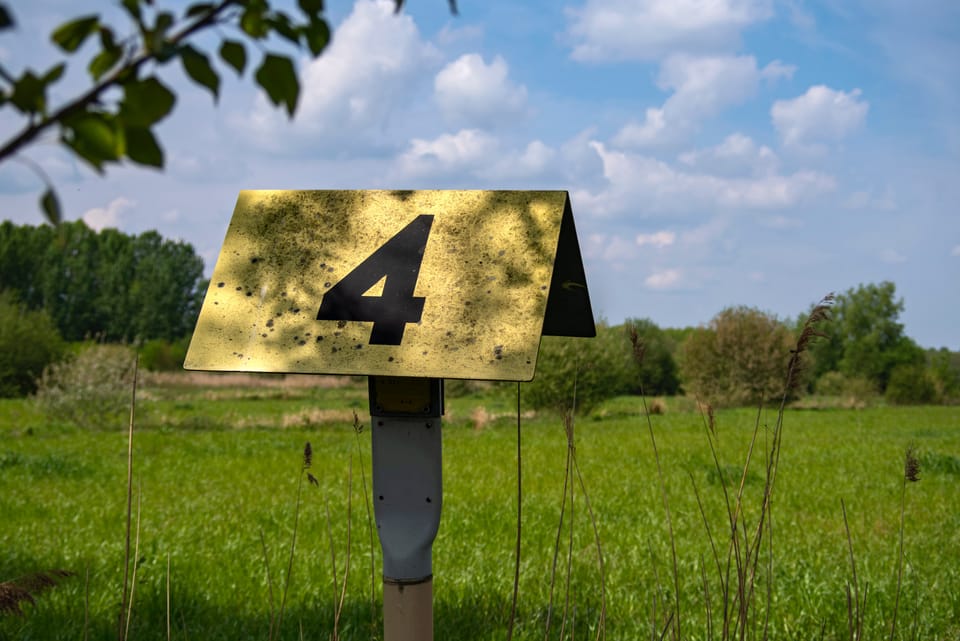
Four Things To Read
We Cannot Cross Until We Carry Each Other, by Arielle Angel: “Most of our internal disagreements center on the correct container for our grief. Our staff is not unlike the rest of the Jewish world in that many of us are only a matter of degrees from someone who died or was taken hostage. How can we publicly grieve the death and suffering of Israelis without these feelings being politically metabolized against Palestinians?” One of the best pieces I’ve read from a Jewish perspective on the war between Israel and Hamas.
The Lust Libel: Sexual Antisemitism in History and Contemporary Culture, by Jonah Cohen: “Going back to the Middle Ages, European art and literature have depicted the Jews as perverse, predatory, pornographic, horny vampires of the Orient. That ghoulish portrait — which, for short, can be called the ‘lust libel’ — is one of the more enduring of the classical antisemitic stereotypes. Today, it is all over the internet, influencing not just disaffected white men but even some prominent members of American popular culture.” This is a very sobering look into an often overlooked corner of antisemitism.
Thanks for reading It All Connects...! Subscribe for free to receive new posts and support my work.
On the Gleefully Indecent Poems of a Medieval Welsh Feminist Poet, by Lauren Cocking: “I labored under the illusion that I was well-versed in literary works about the cunt, especially after writing my university dissertation on that topic. (I titled an academic paper ‘See You Next Tuesday.’ No, I’m not kidding.) But Gwerful Mechain, the title of whose most infamous poem is sometimes translated to ‘Cunt,’ was a name I’d never come across. Perhaps it was because she was a woman; perhaps because she wrote in Welsh; perhaps because she was alive in the 15th century. Medieval literature is so dreary, right?” How can you not want to read more?
So, Gutenberg Didn’t Actually Invent Printing As We Know It, by M. Sophia Newman: “The printing press is often said to have been created by Gutenberg in Mainz, Germany, around 1440 AD, and it began taking root in Europe in the 1450s with the printing of the aforementioned Bible. Books themselves had been present in Europe long before then, of course, but only in hand-copied volumes that were accessible mainly to members of the clergy. Access to mass-produced books revolutionized Europe in the late 1400s, with advancing literacy altering religion, politics, and lifestyles worldwide.” Newman (no relation) goes on to show how this is only part of the story, and a much later part than most realize, since the story begins in Asia. The earliest movable-type-printed book that we know of was produced in Korea in 1377. It’s called Baegun Hwasang Chorok Buljo Jikji Simche Yojeol (The Anthology of Great Buddhist Priests’ Zen Teachings).
Four Things To See
These are paintings by Paul Klee (1879–1940), who is known as the father of Abstract Art and was a central figure of the Bauhaus movement. Influenced by Cubism and Surrealism, he is best known for minimal stick figures, abstract forms, vivid colors and his usage of symbols drawn from imagination, poetry, music, literature, and the world around him.
Hardy Plants (1934)
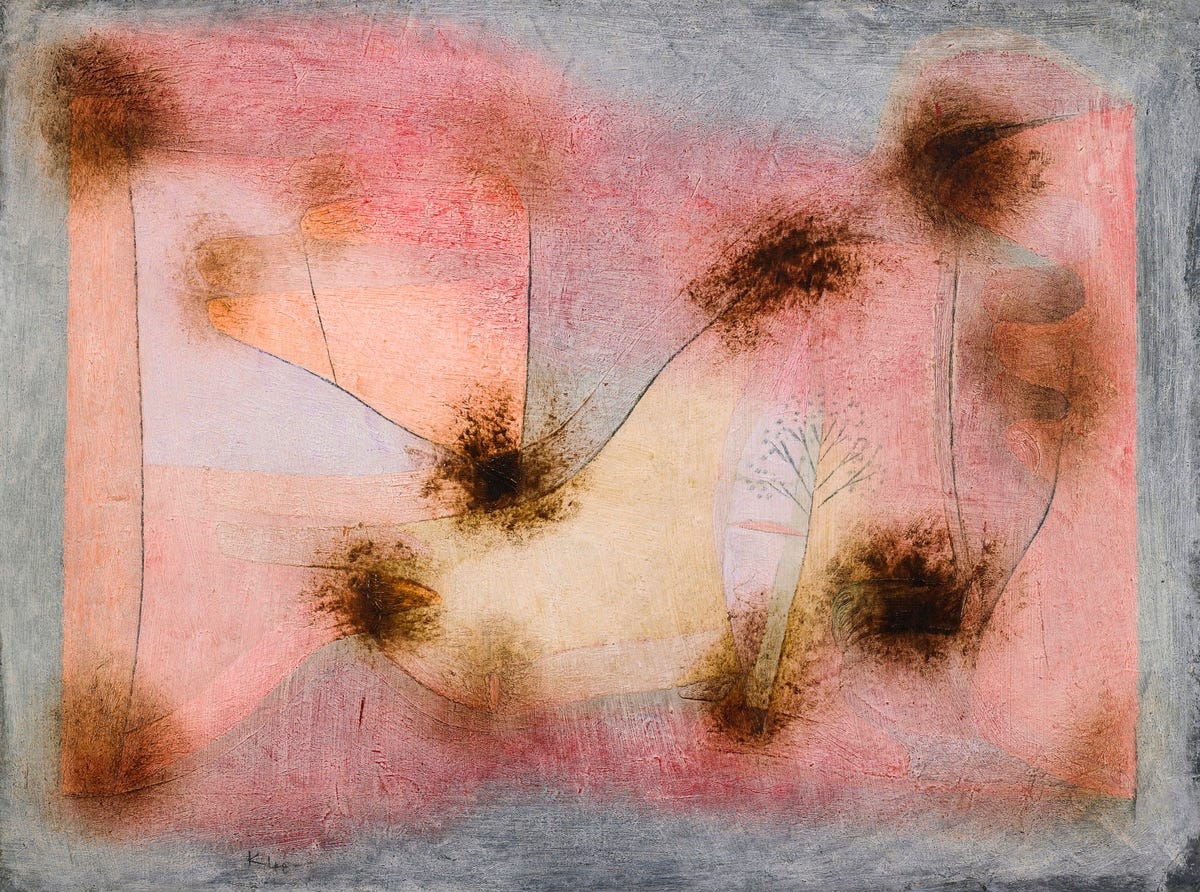
Persische Nachtigallen (Persian Nightingales) (1917)
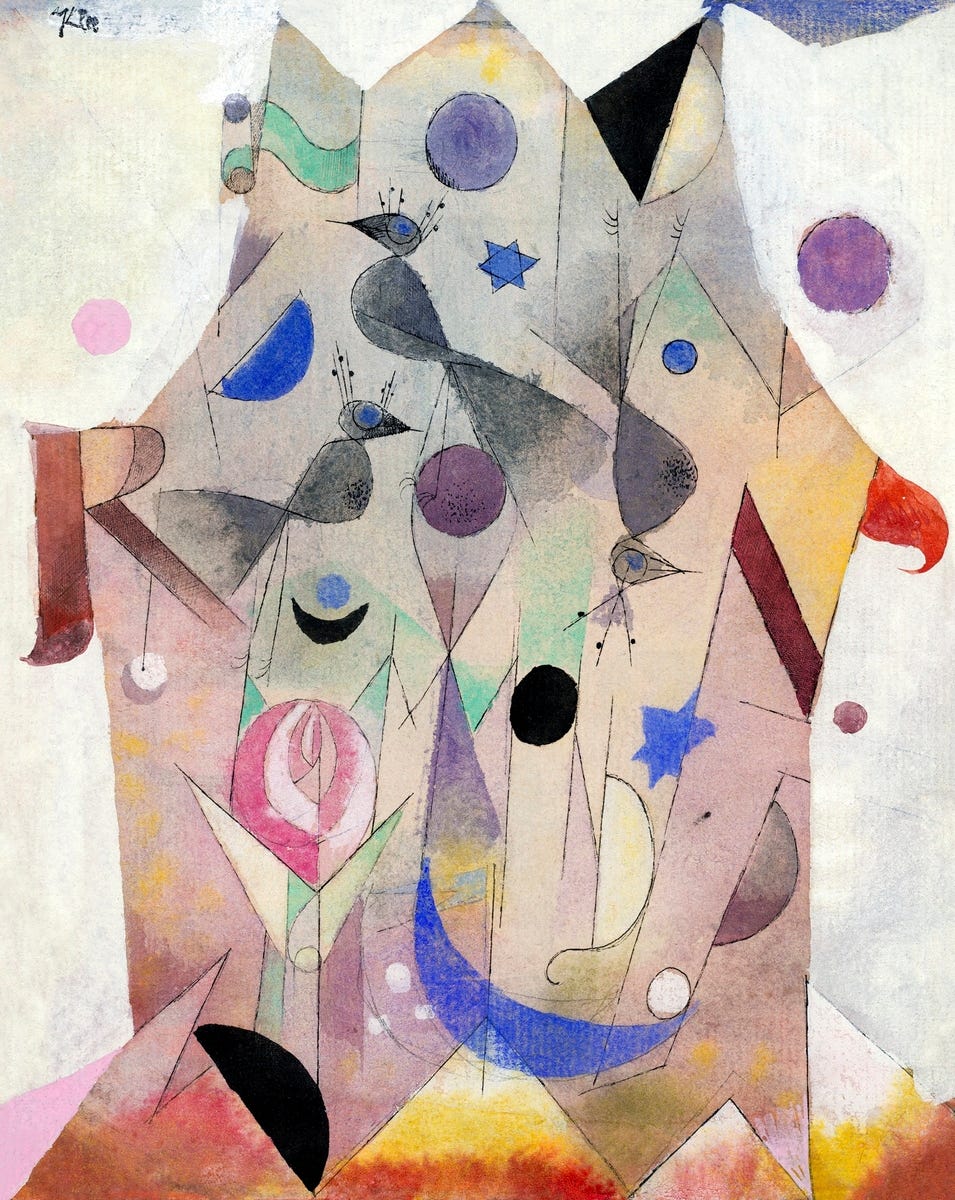
The Harbinger of Autumn
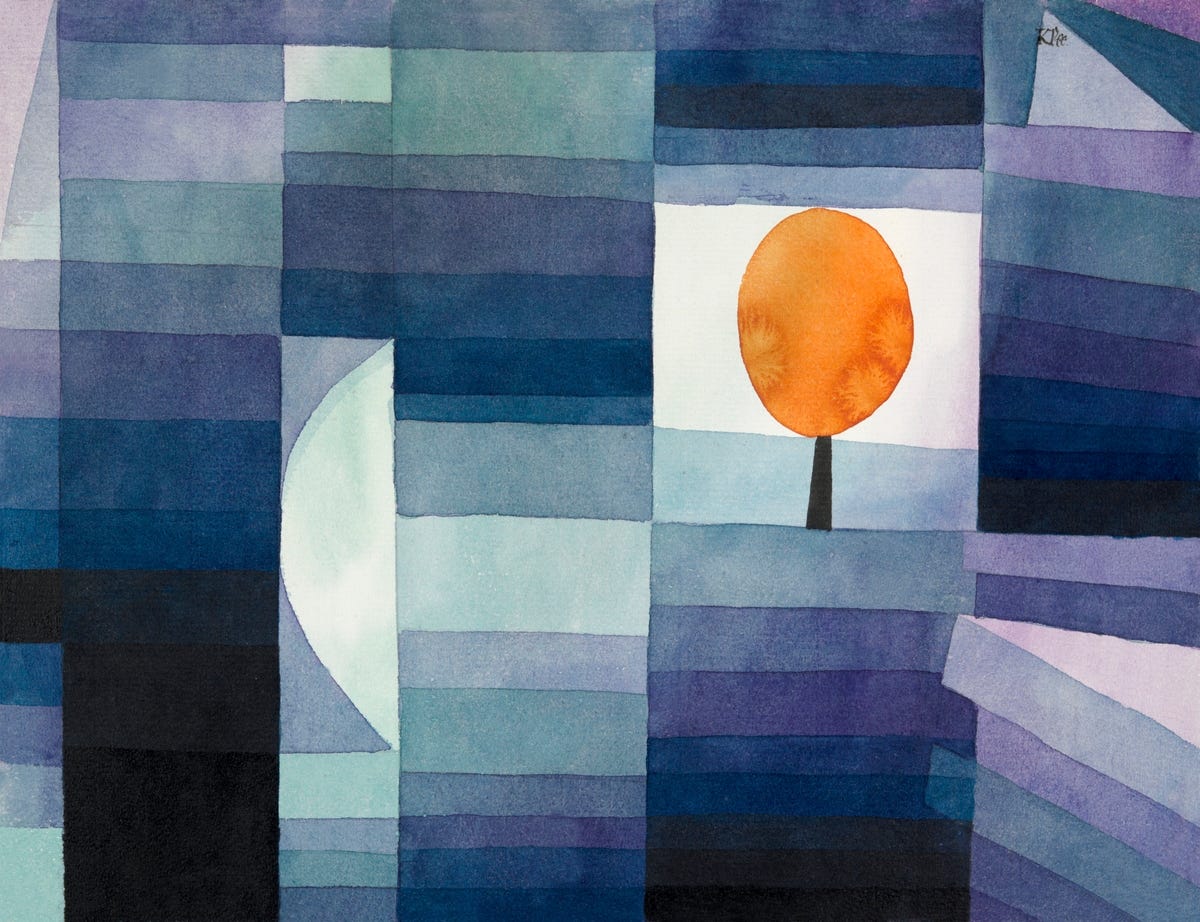
Two Men Meet, Each Believing the Other to Be of Higher Rank (1903)
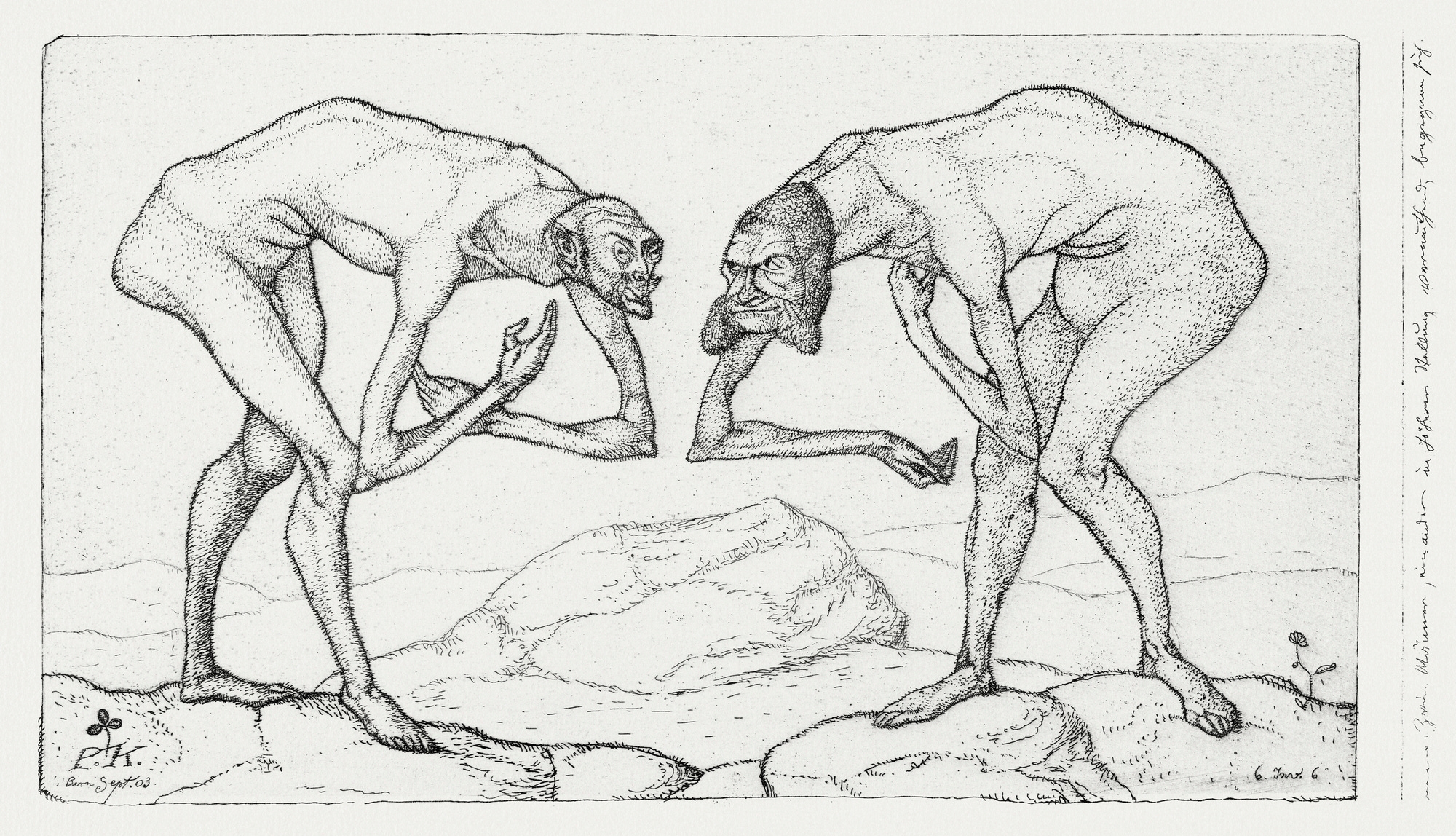
Four Things to Listen To
Beverly “Guitar” Watkins - Rock Me Baby
Yes, with Geddy Lee - Roundabout
Steve Reich - Tehilim
True Blues - The Modern Jazz Quartet
Four Things About Me
I started losing my hair at fifteen years old. I remember when the woman who cut my family’s hair—I want to say her name was Debbie—showed me how to hide my very premature receding hairline by parting my hair in the center rather than on the side. She also encouraged me not to use a blow dryer because, she said, it would dry my hair out and increase the speed at which I was losing it. I listened to her and rarely used a blow dryer after that.
I don’t remember the occasion, but when I was seventeen, my girlfriend wanted to blow dry my hair before we went out. When I sat down in a chair low enough for her see the top of my head—she was quite a bit shorter than I was—she blurted out, “Oh my god! You really are losing your hair.” I’m not sure if she was surprised because she hadn’t believed me when I told her or if it was just the shock of seeing my bald spot, but I know it bothered her. She told me it made her feel very awkward because she associated baldness with old men. I have a memory that this was part of why she broke up with me, but I don’t know if that’s true or if it’s something my insecurity cooked up for me back then that I just haven’t let go of.
I really like cooking. Tonight I made pesto from The New Mediterranean Diet Cookbook.
When I was in 11th grade, Mrs. Lynch—I think her first name was Judy—predicted that I would one day play blues piano in Greenwich Village. I never did, but for one night in my twenties, I came pretty close. My friend Bill and I performed at the Bitter End as part of a showcase a singer-songwriter friend of his had arranged. My friendship with Bill broke not too long after that, however; we parted ways; and I kind of lost whatever desire I’d had to perform on stage. Still, I’ve always been a little sorry I never had the chance to tell Mrs. Lynch how close her prediction came to being true.
Photo by Lucas van Oort on Unsplash.
Thanks for reading It All Connects...! Subscribe for free to receive new posts and support my work.
It All Connects is for anyone who grapples with complexity—of identity, art-making, culture, or conscience—to make a difference in their own life and, potentially, in the life of their community.






Member discussion